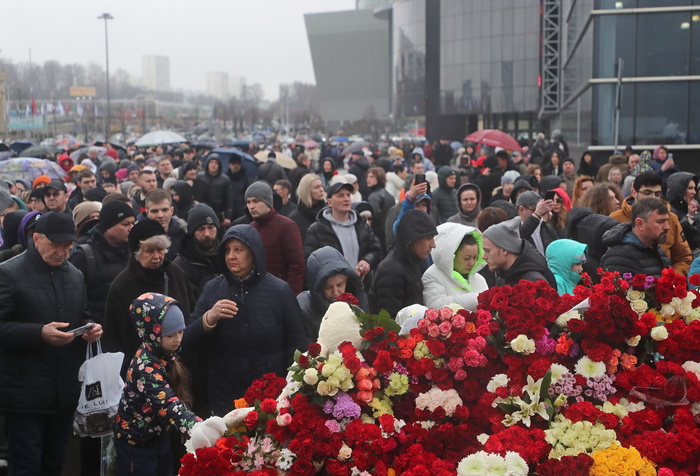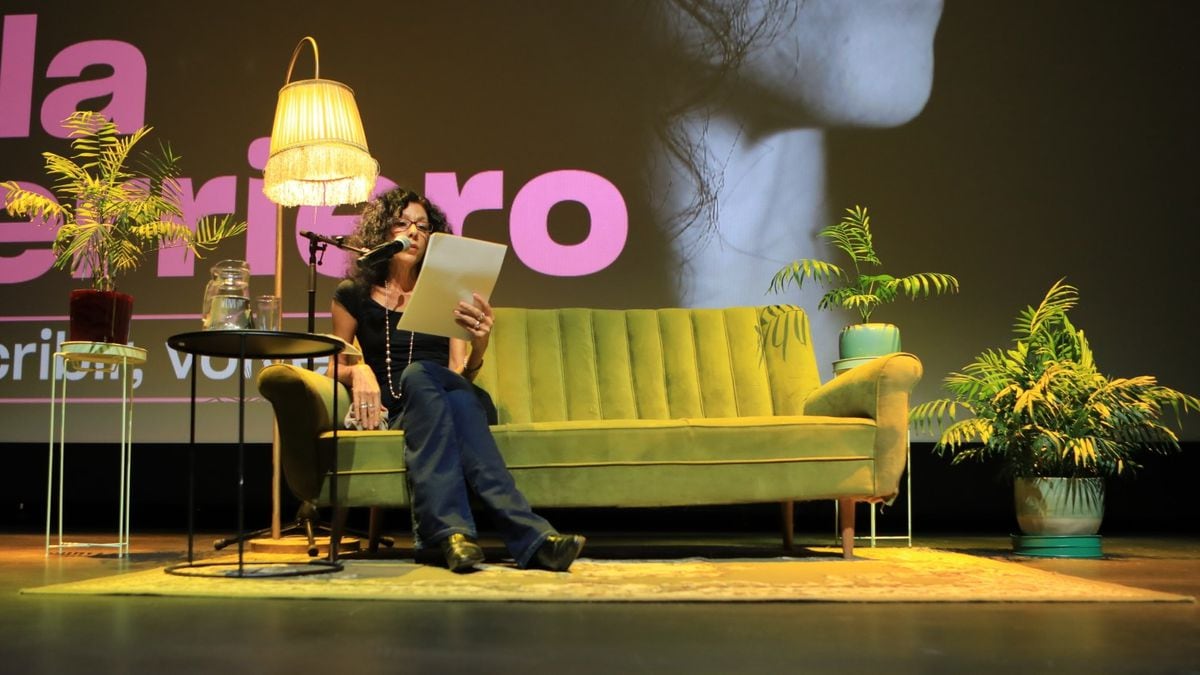Enlarge image
Singer Hamed Sinno and violinist Haig Papazian from Mashrou' Leila.
Until recently, the band also included Carl Gerges and guitarist and keyboardist Firas Abou Fakher
Photo: Burak Cingi/Redferns/Getty Images
On September 22, 2017, a carpet of countless cell phone lights spread out on the outskirts of the Egyptian capital Cairo.
The mobile networks have long since collapsed under the burden of the 35,000 fans.
"Halfway into the concert we couldn't hear ourselves anymore," recalls Haig Papazian, violinist in the band Mashrou' Leila, in a recent documentary by the Guardian.
The crowd sang along so loudly: "It was just a magical moment."
For the Lebanese indie musicians from Mashrou' Leila, the sold-out open-air concert in Cairo was the biggest concert of their career at the time.
The band from Beirut became known with songs about corrupt elites, late nights and queer love and created a musical
safe space
for young progressives and members of the LGBTQ+ community in the Middle East.
Some of her fans wanted to leave this shelter behind in September 2017.
They waved rainbow flags in front of the stage and celebrated the band around the openly gay singer Hamed Sinno.
A fleeting but moving moment of freedom – which shortly thereafter collided with stark reality.
Dozens of Egyptian queers were arrested as a result of the concert.
Many, even though they hadn't even visited it.
Mashrou' Leila were banned from performing in Egypt, they should never play in front of so many people again.
Now, almost exactly five years later, Sinno has announced the end of the most famous Arab indie band.
In the Lebanese podcast Sarde after Dinner, the 34-year-old explained that none of the four band members are currently planning to continue making music together.
The hate comments, the threats - there have become too many: "It's not normal life when 100,000 people write to you on Facebook that you should die," says Sinno.
Voice of the Lebanese underground
It all started so promisingly when, in 2008, a motley group of students got together for jam sessions on the campus of the American University in Beirut (AUB).
Her first album of the same name »Mashrou' Leila« – which can be translated as »Leila's Project« or »Night Project« – was met with enthusiasm in the Arab underground scene in 2009.
Located somewhere between folk, rock and electronic sounds, over which Sinno's enormous vocal volume hovers, the band, which initially consisted of seven people, managed to create their own sound right from the start.
Infused with a self-designed hipster aesthetic, the band filled a void in the aftermath of the 2005 Lebanese Cedar Revolution and on the eve of the 2010/11 Arab Spring.
Their bluntly socially critical and political lyrics, which represented a real alternative to shallow Arabic pop music, spoke to the soul of many young people.
Although Sinno's homosexuality may not have been known to all fans of the hour zero, the charismatic singer never made a secret of it.
In one of her first hits, »Shim el Yasmine« (»Scent of jasmine«), it says: »I would have liked to have had you near me, introduced you to my parents, crowned my heart with you.« The lyrical I speaks to you Man.
Arabic has two grammatical genders, but the use of the masculine form is not uncommon at first.
She features in classic Arabic love poetry as well as in Egyptian pop titan Amr Diab.
However, the song goes on to say: »I wanted to be your housewife.« A game with gender roles.
child of the night
When fans waved a rainbow flag at the first major Mashrou' Leila concert at Lebanon's Byblos Festival in 2010, Sinno tied it prominently to his microphone stand.
The action had no far-reaching consequences at the time.
In 2012, the singer graced the cover of French LGBTQ+ magazine Têtu and Jordanian queer magazine My.Kali.
In this way, Sinno became one of the loudest voices in the struggle for self-determination and representation in the region and the Arab diaspora, reinforced by the support of its band members.
But with the success of the band, which was soon to perform in cities such as Berlin, Paris and New York, hostilities against Mashrou' Leila increased.
After the release of their third album »Ibn El Leil« (»Child of the Night«) in 2015, the band was no longer allowed to perform in Jordan.
In some of the songs, Sinno processes his drug and alcohol abuse.
"I felt guilty"
Mashrou' Leila had already played a few concerts in Egypt when they shared the stage with two other bands in September 2017.
Among the screaming crowd was Sarah Hegazi.
Like Sinno, the Egyptian communist and feminist had come out.
Homosexuality is not a criminal offense in Egypt.
Existing laws on “fornication” and prostitution are repeatedly used by the Egyptian regime to intimidate and imprison queer people.
Hegazi knew the dangers when she raised a rainbow flag during the show.
A blurred photo of each night shows how relaxed and happy she is nonetheless.
Shortly thereafter, security authorities arrested Hegazi.
When she left her cell after three months in prison, she reported being tortured with electric shocks and sexually molested.
The ghosts of the Egyptian dungeons would also haunt her in Canadian exile.
There, the then 30-year-old Hegazi took her own life in June 2020.
The news of his death reached Sinno in New York, where he and Geiger Papazian have lived since early 2019.
"I felt guilty," says the singer in the podcast that has now been released, which can also be seen filmed on YouTube.
Visibly moved, he tells how Hegazi's suicide is one of the main reasons why he no longer wants to continue Mashrou' Leila.
Persistent grievances – and hope
There were also financial worries: Even where everything began for the band - in Lebanon - the musicians were recently no longer able to perform.
A renewed appearance at the annual Byblos Festival had to be canceled in 2019 after massive threats of violence from Christian hardliners.
The Lebanese events industry is already badly hit after the 2019/20 protest wave, the devastating explosion in the Beirut port and the ongoing, massive economic crisis, which Sinno followed from afar.
Only performing on stages outside the Middle East is out of the question for the band.
The end for Mashrou' Leila comes after 14 years, four albums, one EP and many concerts due to the abuses that the band had been alluding to for so long.
He still has hope, says Sinno.
After all, all band members are geniuses.
He himself is currently working on an opera, has recently completed a master's degree in digital music from a US university and has published an essay in English in an anthology.
The title of the volume is quite naturally »This Arab is Queer« – »This Arab is queer«.









